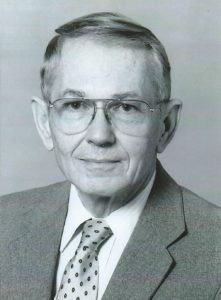 Professor Howard Benedict Palmer, a former Senior Associate Dean of the Graduate School at The Pennsylvania State University, United States, passed away on 19 January 2017. A dedicated member of The Combustion Institute, Palmer’s work vastly advanced research in flames and combustion processes; kinetics of fast gaseous reactions, carbon formation and carbon vaporization; mechanisms, emission spectra, and photon yields in chemiluminescent gaseous reactions; PVT behavior of fluids; and solar gas turbines for power production.
Professor Howard Benedict Palmer, a former Senior Associate Dean of the Graduate School at The Pennsylvania State University, United States, passed away on 19 January 2017. A dedicated member of The Combustion Institute, Palmer’s work vastly advanced research in flames and combustion processes; kinetics of fast gaseous reactions, carbon formation and carbon vaporization; mechanisms, emission spectra, and photon yields in chemiluminescent gaseous reactions; PVT behavior of fluids; and solar gas turbines for power production.
As published in the official obituary, Prof. Palmer joined the Penn State faculty as Assistant Professor of fuel technology in 1955. He was promoted to Associate Professor in 1957 and Professor in 1960. In 1959, Palmer was named head of the Department of Fuel Technology, a position he held until 1965. He retired in 1991 as Professor Emeritus of Energy Science and as Senior Associate Dean of the Graduate School.
Prof. Palmer had a great dedication to The Combustion Institute. He served as U.S. Editor of Combustion and Flame (1972-1984). He was also a member of the CI Board of Directors, Vice-President, and then served as President (1985-1988). In 1998, Palmer was honored with the Alfred C. Egerton Gold Medal during the 27th International Symposium on Combustion at the University of Colorado Boulder, United States. He received the medal “for distinguished, continuing and encouraging contributions to the field of combustion.”
Prof. Palmer served as consultant or advisor to a number of industrial and governmental organizations, including Brookhaven National Laboratory, United Technologies Research Center, Exxon Laboratories, the Orbiting Space Laboratory Program of NASA, the University Space Research Association, and Sandia-Livermore National Laboratory. He served frequently as a public-service consultant to federal agencies and a referee for journals and proposals.
In the Graduate School at Penn State, Prof. Palmer carried the responsibility for academic policies and procedures. He monitored academic performance of graduate students and the quality of graduate offerings. He was responsible for administration of intercollege graduate degree programs, and for the operation of the Graduate Council. He also served as the Penn State representative to various associations of graduate deans. As a prolific author and educator, Palmer directed research of 35 graduate students and postdoctoral scholars, and published about 120 papers or book chapters on his research. He also edited and coauthored a volume on modern developments in combustion technology.
For more information about the life and work of Prof. Palmer, read the published obituary. The Combustion Institute honors Palmer’s accomplishments and the work of scientific leaders who make significant contributions for the advancement of many diverse communities around the world.
